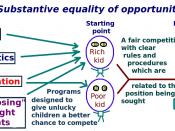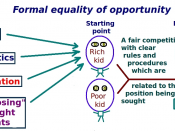Rawls theory of justice revolves around the adaptation of two fundamental principles of justice which would, in turn, guarantee a just and morally acceptable society. The first principle guarantees the right of each person to have the most extensive basic liberty compatible with the liberty of others. The second principle states that social and economic positions are to be a) to everyone's advantage and b) open to all.
A key problem to Rawls is to show how such principles would be universally adopted and here the work borders on general ethical issues. He introduces a theoretical 'veil of ignorance' in which all the 'players' in the social game would be placed in a situation which is called the 'original position'. Having only a general knowledge of the facts of 'life and society', each player is to abide based on their moral obligation. By denying the players any specific information about themselves it forces them to adopt a generalized point of view that bears a strong resemblance to the moral point of view.
'Moral conclusions can be reached without abandoning the prudential standpoint of positing, a moral outlook merely by pursuing one's own prudential reasoning under certain procedural bargaining and knowledge constraints.'
Rawls proposes that the most reasonable principles of justice for a society are those that individuals would themselves agree to behind the 'veil of ignorance', in circumstances in which each is represented as a moral person, endowed with the basic moral powers. What this position supports is that while each person has different ends and goals, different backgrounds and talents, each ought to have a fair chance to develop his or her talents and to pursue those goals - fair equality for opportunity. It is not a race or contest where the talented or gifted prevail,


